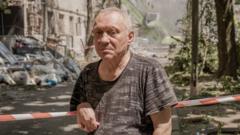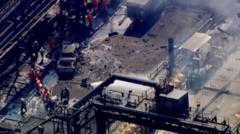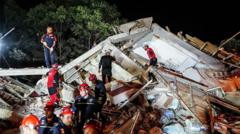In the early hours, Kyiv experienced one of its most catastrophic nights since the invasion, with a single cruise missile strike resulting in extensive destruction and fatalities. As families navigate the chaos, the urgent need for international support and comprehensive air defenses is brought to the forefront against the backdrop of failed diplomatic conversations.
Destruction and Loss: A Night of Air Strikes in Kyiv

Destruction and Loss: A Night of Air Strikes in Kyiv
The aftermath of a devastating missile strike in Kyiv leaves families shattered, with a growing death toll as rescue operations continue.
On a tragic night in Kyiv, the impact of war crystallized as a cruise missile struck a residential building, resulting in widespread destruction and human suffering. Evhen Povarenkov, a resident in a suburb of the Ukrainian capital, found himself unable to reach safety as the missile hit, recalling the horrific scene that unfolded. "It was terrible; everything was destroyed," he said, surveying the wreckage of his apartment.
The missile struck the Solomianskyi neighborhood, obliterating 35 apartments and killing at least 23 people by Wednesday afternoon. The air strike was part of a broader Russian assault involving over 440 drones and 32 missiles, marking one of the most brutal bombardments of Kyiv since the full-scale war began. The sheer volume of the attacks exemplifies a concerted effort to inflict significant chaos and fear upon the civilian population.
Povarenkov shared his harrowing experience of the strike, saying he was in bed when the missile hit. “I lost consciousness. When I came to, I heard my mother screaming.” His elderly mother sustained severe injuries, requiring immediate medical attention as they navigated through burning debris and fallen structures to escape the destruction.
Witnesses described the scene as chaotic, with children crying and neighbors assisting each other amid the flames and debris. Emergency responders worked to rescue those trapped beneath the rubble, while hospitals braced for an influx of casualties. Medical personnel like Serhii Dubrov reported a range of traumatic injuries, from lacerations to severe internal damage, underscoring the indiscriminate nature of such attacks.
For some, like Oleksandr Bondarchuk, the fear kept them in their homes, unable to reach shelters in time. "It was terrible. Everything was destroyed," he lamented, emphasizing the vulnerability of those in high-risk demographics during these assaults.
The timing of the strikes coincided with Ukrainian President Volodymyr Zelensky’s attendance at the G7 conference in Canada, leading many to interpret the escalation of violence as a calculated move by Russia. Zelensky’s diplomatic efforts to secure aid and support appeared to falter as discussions with key leaders, including U.S. President Donald Trump, were overshadowed by the ongoing crisis.
As the sun rises on Kyiv following the catastrophic night, communities come together to mourn their losses and reflect on the urgent need for international assistance and a more robust defensive strategy. People gathered to honor the victims, laying flowers at the sites where lives were irrevocably changed. As rescue teams continued their operations, the once vibrant neighborhood now stood as a stark reminder of the pervasive toll of war.




















